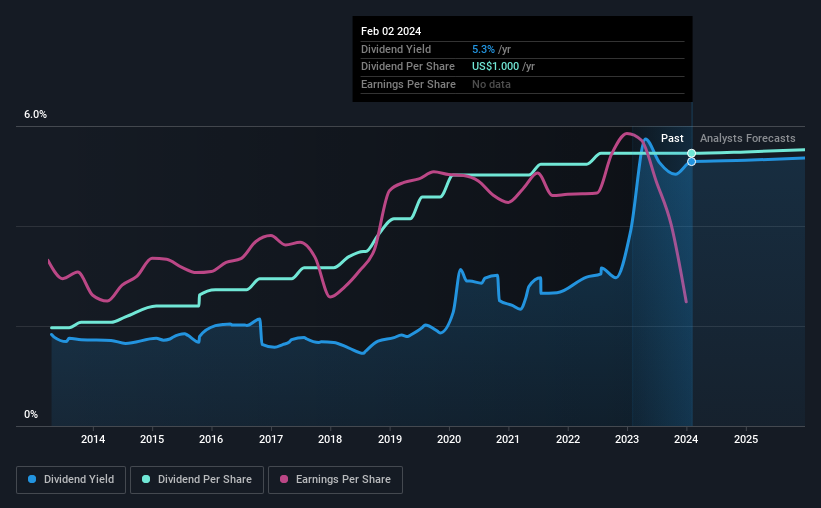Don't Buy Bank of Marin Bancorp (NASDAQ:BMRC) For Its Next Dividend Without Doing These Checks
Bank of Marin Bancorp (NASDAQ:BMRC) stock is about to trade ex-dividend in 4 days. The ex-dividend date is one business day before a company's record date, which is the date on which the company determines which shareholders are entitled to receive a dividend. The ex-dividend date is of consequence because whenever a stock is bought or sold, the trade takes at least two business day to settle. Therefore, if you purchase Bank of Marin Bancorp's shares on or after the 7th of February, you won't be eligible to receive the dividend, when it is paid on the 15th of February.
The company's upcoming dividend is US$0.25 a share, following on from the last 12 months, when the company distributed a total of US$1.00 per share to shareholders. Based on the last year's worth of payments, Bank of Marin Bancorp has a trailing yield of 5.3% on the current stock price of US$18.91. We love seeing companies pay a dividend, but it's also important to be sure that laying the golden eggs isn't going to kill our golden goose! As a result, readers should always check whether Bank of Marin Bancorp has been able to grow its dividends, or if the dividend might be cut.
See our latest analysis for Bank of Marin Bancorp
If a company pays out more in dividends than it earned, then the dividend might become unsustainable - hardly an ideal situation. Its dividend payout ratio is 80% of profit, which means the company is paying out a majority of its earnings. The relatively limited profit reinvestment could slow the rate of future earnings growth. We'd be concerned if earnings began to decline.
Generally speaking, the lower a company's payout ratios, the more resilient its dividend usually is.
Click here to see the company's payout ratio, plus analyst estimates of its future dividends.
Have Earnings And Dividends Been Growing?
Companies with falling earnings are riskier for dividend shareholders. If earnings fall far enough, the company could be forced to cut its dividend. With that in mind, we're discomforted by Bank of Marin Bancorp's 12% per annum decline in earnings in the past five years. Such a sharp decline casts doubt on the future sustainability of the dividend.
Another key way to measure a company's dividend prospects is by measuring its historical rate of dividend growth. Bank of Marin Bancorp has delivered 11% dividend growth per year on average over the past 10 years. The only way to pay higher dividends when earnings are shrinking is either to pay out a larger percentage of profits, spend cash from the balance sheet, or borrow the money. Bank of Marin Bancorp is already paying out a high percentage of its income, so without earnings growth, we're doubtful of whether this dividend will grow much in the future.
Final Takeaway
Is Bank of Marin Bancorp an attractive dividend stock, or better left on the shelf? We're not overly enthused to see Bank of Marin Bancorp's earnings in retreat at the same time as the company is paying out more than half of its earnings as dividends to shareholders. Bank of Marin Bancorp doesn't appear to have a lot going for it, and we're not inclined to take a risk on owning it for the dividend.
With that being said, if you're still considering Bank of Marin Bancorp as an investment, you'll find it beneficial to know what risks this stock is facing. Case in point: We've spotted 2 warning signs for Bank of Marin Bancorp you should be aware of.
Generally, we wouldn't recommend just buying the first dividend stock you see. Here's a curated list of interesting stocks that are strong dividend payers.
Have feedback on this article? Concerned about the content? Get in touch with us directly. Alternatively, email editorial-team (at) simplywallst.com.
This article by Simply Wall St is general in nature. We provide commentary based on historical data and analyst forecasts only using an unbiased methodology and our articles are not intended to be financial advice. It does not constitute a recommendation to buy or sell any stock, and does not take account of your objectives, or your financial situation. We aim to bring you long-term focused analysis driven by fundamental data. Note that our analysis may not factor in the latest price-sensitive company announcements or qualitative material. Simply Wall St has no position in any stocks mentioned.

